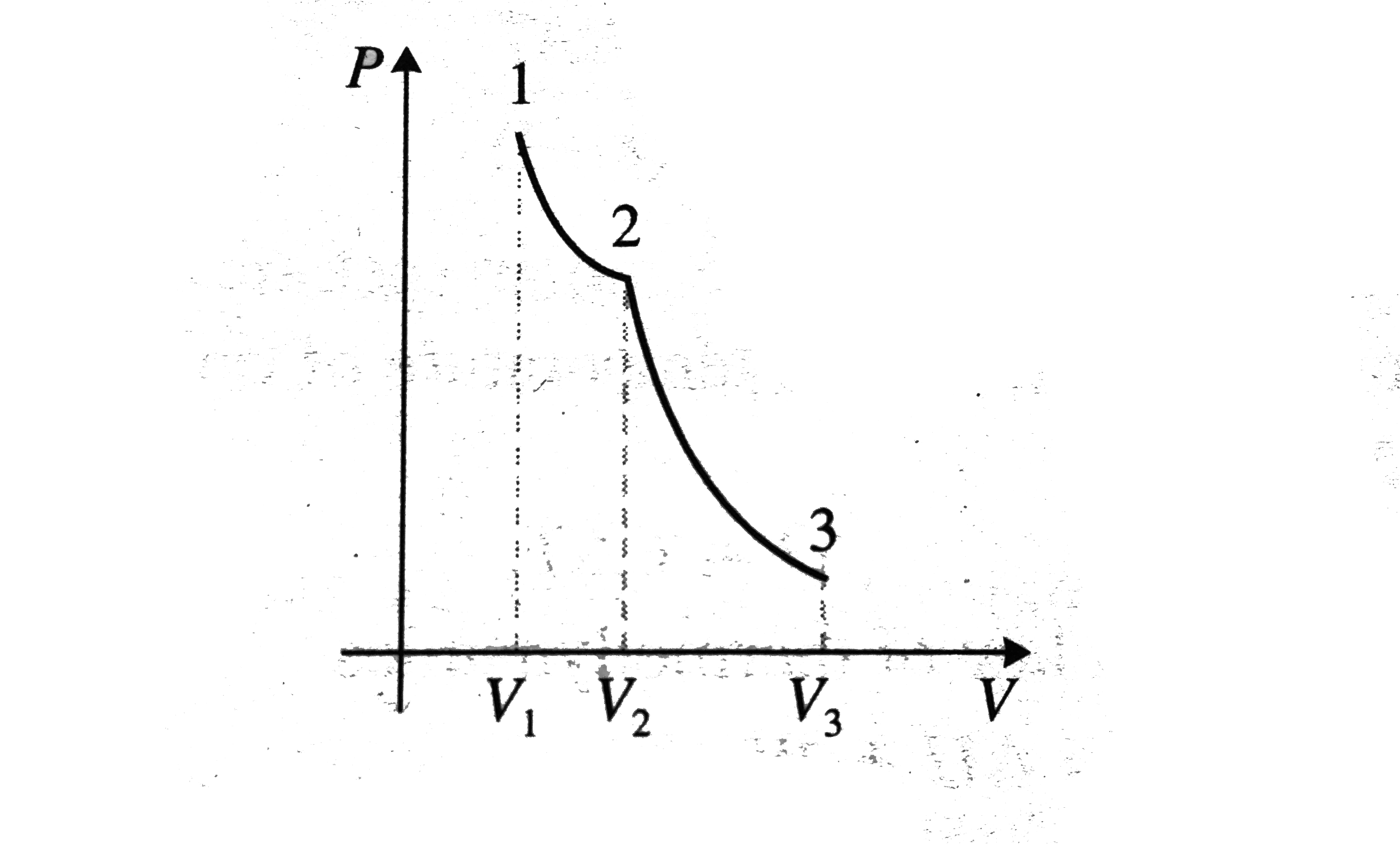One mole of a perfect gas expands adiabatically .As a result of this,its pressure ,temperature and volume changes from P1,T1,V1, to P2,T2,V2 respectively .If molar specific heat at volume is Cv then work done by the gas wil be ?
The correct Answer is:D
To solve the problem of finding the work done by one mole of a perfect gas during an adiabatic expansion, we can follow these steps:
1. Understand the Adiabatic Process:
In an adiabatic process, there is no heat exchange with the surroundings. Therefore, the heat transfer dq is equal to zero.
2. Apply the First Law of Thermodynamics:
The first law of thermodynamics states:
dq=du+dw
Since dq=0 for an adiabatic process, we can rewrite this as:
0=du+dw
This implies:
du=−dw
3. Relate Change in Internal Energy to Temperature:
The change in internal energy du for one mole of gas can be expressed using the specific heat at constant volume Cv:
du=CvdT
where dT is the change in temperature.
4. Substitute for du in the First Law Equation:
From the previous steps, we can substitute du in the first law equation:
CvdT=−dw
Rearranging gives us:
dw=−CvdT
5. Integrate to Find Work Done:
To find the total work done W during the expansion from an initial temperature T1 to a final temperature T2, we integrate:
W=∫T2T1−CvdT=−Cv∫T2T1dT
This simplifies to:
W=−Cv(T2−T1)
Therefore, the work done by the gas is:
W=Cv(T1−T2)
Final Result:
The work done by the gas during the adiabatic expansion is:
W=Cv(T1−T2)
In an adiabatic process, there is no heat exchange with the surroundings. Therefore, the heat transfer dq is equal to zero.
The first law of thermodynamics states:
dq=du+dw
Since dq=0 for an adiabatic process, we can rewrite this as:
0=du+dw
This implies:
du=−dw
The change in internal energy du for one mole of gas can be expressed using the specific heat at constant volume Cv:
du=CvdT
where dT is the change in temperature.
From the previous steps, we can substitute du in the first law equation:
CvdT=−dw
Rearranging gives us:
dw=−CvdT
To find the total work done W during the expansion from an initial temperature T1 to a final temperature T2, we integrate:
W=∫T2T1−CvdT=−Cv∫T2T1dT
This simplifies to:
W=−Cv(T2−T1)
Therefore, the work done by the gas is:
W=Cv(T1−T2)
The work done by the gas during the adiabatic expansion is:
W=Cv(T1−T2)
Topper's Solved these Questions
Similar Questions
Calculate the work done when one mole of a perfect gas is compressed adiabatically. The initial pressure and volume of the gas are 105N/m2 and 6 litres respectively. The final volume of the gas are 2 litre. Molar specific heat of the gas at constant volume is 3R/2.
View SolutionOne mole of ideal gas goes through processP=2V21+V2. Then change in temperature of gas when volume changes from V=1m2 to 2m2 is :
View Solution
Knowledge Check
A one mole of an ideal gas expands adiabatically ato constant pressure such that its temperature T∝1√V .The value of the adiabatic constant gas is
Aa.1.3Bb.1.5Cc.1.67Dd.2
For a sample of n mole of a perfect gas at constant temperature T (K) when its volume is changed from V1 to V2 the entropy change is given by
View SolutionAn ideal gas having initial pressure p, volume V and temperature T is allowed to expand adiabatically until its volume becomes 5.66V, while its temperature falls to T/2.
(a) How many degrees of freedom do the gas molecules have?
(b) Obtain the work done by the gas during the expansion as a function of the initial pressure p and volume V.
Given that (5.66)0.4=2
View SolutionOne mole of a perfect gas, initally at a pressure and temperature of 105N/m2 and 300 K, respectively, expands isothermally unitl its volume is doubled and then adiabatically until its volume is again doubled. Find final pressure and temperature of the gas Find the total work done during the isothermal and adiabatic processes. Given γ=1.4. Also draw the P-V diagram for the process.

View SolutionOne mole of an ideal gas at temperature T expands slowly according to the law pV= constant.
Its final temperature is T2. The work done by the gas is
View SolutionOne mole of an ideal gas at temperature T expands slowly according to the law pV= constant.
Its final temperature is T2. The work done by the gas is
View SolutionOne mole of an ideal gas at temperature T expands slowly according to the law pV= constant.
Its final temperature is T2. The work done by the gas is
View SolutionAt 27∘C two moles of an ideal monatomic gas occupy a volume V. The gas expands adiabatically to a volume 2V. Calculate
(a) final temperature of the gas
(b) change in its internal energy and
(c) the work done by the gas during the process. [ R=8.31J/mol−K]
View Solution